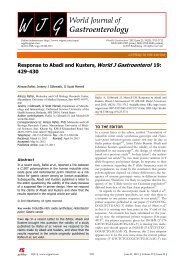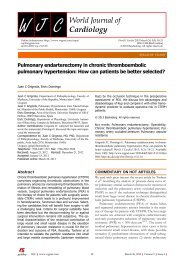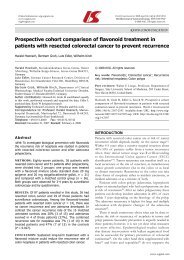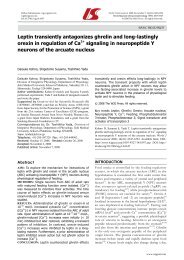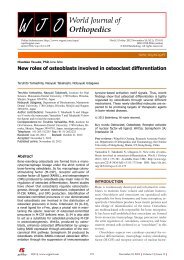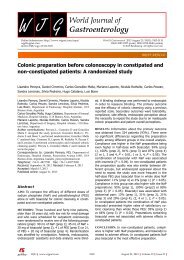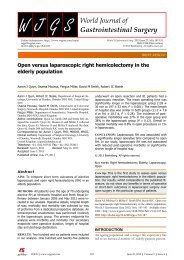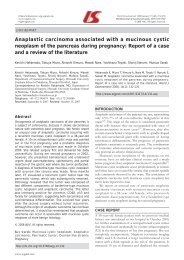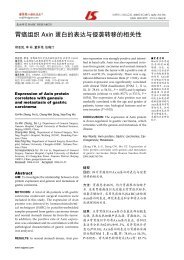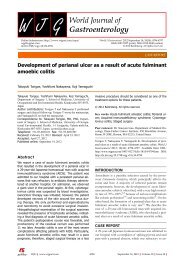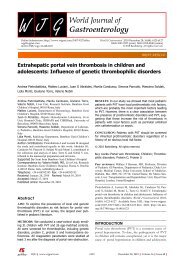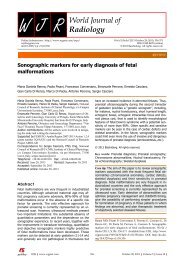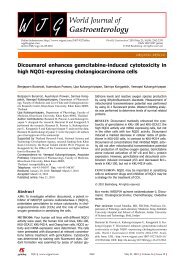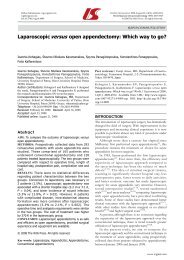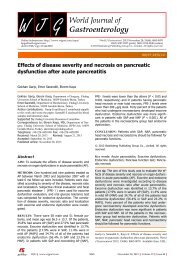Ghrelin's second life - World Journal of Gastroenterology
Ghrelin's second life - World Journal of Gastroenterology
Ghrelin's second life - World Journal of Gastroenterology
Create successful ePaper yourself
Turn your PDF publications into a flip-book with our unique Google optimized e-Paper software.
Online Submissions: http://www.wjgnet.com/1007-9327<strong>of</strong>fice<br />
wjg@wjgnet.com<br />
doi:10.3748/wjg.v18.i25.3196<br />
Toru Ishikawa, MD, PhD, Series Editor<br />
WJG|www.wjgnet.com<br />
3196<br />
<strong>World</strong> J Gastroenterol 2012 July 7; 18(25): 3196-3200<br />
ISSN 1007-9327 (print) ISSN 2219-2840 (online)<br />
© 2012 Baishideng. All rights reserved.<br />
TOPIC HIGHLIGHT<br />
Can zinc enhance response interferon therapy for patients<br />
with HCV-related liver disease?<br />
Toru Ishikawa<br />
Toru Ishikawa, Department <strong>of</strong> <strong>Gastroenterology</strong> and Hepatology,<br />
Saiseikai Niigata Daini Hospital, Niigata 950-1104, Japan<br />
Author contributions: Ishikawa T contributed solely to this<br />
review.<br />
Correspondence to: Toru Ishikawa, MD, PhD, Department<br />
<strong>of</strong> <strong>Gastroenterology</strong> and Hepatology, Saiseikai Niigata Daini<br />
Hospital, 280-7 Teraji, Niigata 950-1104,<br />
Japan. toruishi@ngt.saiseikai.or.jp<br />
Telephone: +81-25-2336161 Fax: +81-25-2338880<br />
Received: August 17, 2011 Revised: September 24, 2011<br />
Accepted: October 11, 2011<br />
Published online: July 7, 2012<br />
Abstract<br />
Patients with liver disease may be at risk <strong>of</strong> zinc depletion.<br />
Zinc supplementation has been shown to contribute<br />
to inhibition <strong>of</strong> liver fibrosis and improvement in<br />
hepatic encephalopathy. However, little is known about<br />
the anti-inflammatory effect <strong>of</strong> zinc on hepatitis C virus<br />
(HCV)-related chronic liver disease. The standard<br />
<strong>of</strong> care for chronic HCV has improved markedly since<br />
the approval <strong>of</strong> interferon (IFN) therapy more than a<br />
decade ago. Over the past 20 years, IFN therapy has<br />
improved to more effectively eliminate the virus, progressing<br />
from single IFN therapy to combination therapy<br />
with ribavirin (RBV) and finally to pegylated IFN<br />
(PEG-IFN) therapy. However, even combined therapy<br />
with PEG-IFN and RBV for 48 wk is unable to eliminate<br />
the virus in some 40% <strong>of</strong> hepatitis C cases, particularly<br />
those with genotype 1b and high viral load. Treatment<br />
options for patients who have relapsed or are refractory<br />
to treatment with PEG-IFN and RBV therefore<br />
need to be critically assessed. This paper overviews<br />
the relationship between chronic liver disease and zinc<br />
metabolism.<br />
© 2012 Baishideng. All rights reserved.<br />
Key words: Chronic hepatitis C; Zinc; Interferon therapy<br />
Peer reviewers: Heitor Rosa, Pr<strong>of</strong>essor, Department <strong>of</strong> <strong>Gastroenterology</strong><br />
and Hepatology, Federal University School <strong>of</strong> Medicine,<br />
Rua 126 n.21, Goiania-GO 74093-080, Brazil; Natalia A<br />
Osna, MD, PhD, Liver Study Unit, Research Service (151), VA<br />
Medical Center, 4101 Woolworth Avenue, Omaha, NE 68105,<br />
United States<br />
Ishikawa T. Can zinc enhance response interferon therapy for<br />
patients with HCV-related liver disease? <strong>World</strong> J Gastroenterol<br />
2012; 18(25): 3196-3200 Available from: URL: http://www.<br />
wjgnet.com/1007-9327/full/v18/i25/3196.htm DOI: http://<br />
dx.doi.org/10.3748/wjg.v18.i25.3196<br />
LIVER DISEASE AND ABNORMAL METAL<br />
METABOLISM<br />
Abnormal metal metabolism, which is related to liver<br />
disease, has long been a subject <strong>of</strong> pathological study,<br />
particularly storage diseases such as iron metabolism in<br />
hemochromatosis [1] and copper metabolism in Wilson’s<br />
disease [2] .<br />
As nutrition science has advanced, it has recently been<br />
pointed out that trace metallic elements in blood play essential<br />
roles, and abnormal metal metabolism involving<br />
metal deficiency in various diseases has been studied.<br />
Zinc is an essential trace element in the human body,<br />
with approximately 2 g distributed throughout the body<br />
<strong>of</strong> a healthy adult, including many organs [3-5] . In vivo, this<br />
element stimulates the activity <strong>of</strong> as many as 300 metal<br />
enzymes and metal-activated enzymes, and is crucial<br />
for nucleic acids and protein metabolism. Zinc plays an<br />
important role in the activity <strong>of</strong> many enzyme proteins,<br />
and a deficiency <strong>of</strong> zinc causes various pathologic disorders<br />
in the human body.<br />
Regarding zinc metabolism abnormality in liver disease,<br />
in 1951 Vikbladh pointed out that the zinc content<br />
in serum was low in the case <strong>of</strong> various liver diseases [6] ,<br />
and conjectured that serum contains albumin loosely<br />
July 7, 2012|Volume 18|Issue 25|



